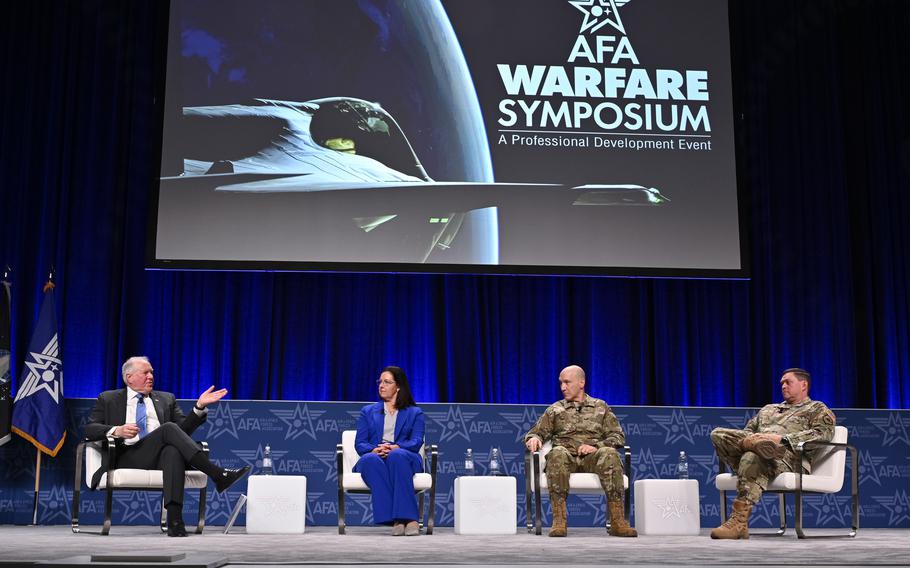
Air Force Secretary Frank Kendall leads a panel discussion called “Reoptimizing for Great Power Competition: A Senior Leaders Discussion” during the Air and Space Forces Association 2024 Warfare Symposium in Aurora, Colo., on Feb. 12, 2024, with Kristyn Jones, acting undersecretary of the Air Force, Gen. David Allvin, the service chief of staff, and Gen. Chance Saltzman, chief of space operations. (Eric Dietrich/U.S. Air Force)
The Air Force will add a new command focused on modernization led by a three-star general, create more technical jobs and redesign and rename its training command as part of an overhaul to prepare its troops for future fights, Air Force Secretary Frank Kendall said.
Kendall announced 24 changes that are meant to “address the current force and our ability to stay competitive,” in what he and other Air Force senior leaders have repeatedly referred to as the “great-power competition.”
Air Force leaders see China’s military advancements and Russia’s aggression in Europe as a call to reevaluate its fighting force and capabilities. There also has been a resurgence of Middle East tension and provocations from North Korea, Gen. David Allvin, the service chief of staff, wrote in a 12-page document supporting the need for change.
“We cannot afford to be complacent, holding on to outdated structures. The Air Force built for the previous era is no longer optimized for the current strategic landscape,” he wrote. “We need these changes now. We are out of time to reoptimize our forces to meet the strategic challenges in a time of great-power competition.”
Kendall, Allvin and other Air Force leaders laid out their plans Monday during the Air and Space Forces Association’s Warfare Symposium in Colorado.
Largest among those changes is the creation of the Integrated Capabilities Command. Led by a three-star general, the command is expected to drive modernization investments for the Department of the Air Force.
“We’re enabling end-to-end creation of effects,” said Kristyn Jones, acting undersecretary of the Air Force. “This organization will help us to prioritize our investments and will be responsible for working with us to determine the next iteration of operational imperatives.”
It will be responsible for integrating weapons development, operations and what should be a priority. This will work together with a separate acquisitions and sustainment group to provide airmen with what they need, according to the service.
Space Force will get its own version, known as the Space Force Futures Command, which will conduct experiments and war games as well as develop and validate concepts.
The Air Force announcement briefly mentioned Air Education Training Command now will be called Airman Development Command. The command already runs all levels of the Air Force’s training programs, including pilot training and basic training.
Under the new name, the command will have a “people-focused footprint” to rapidly adapt training programs and curriculum to produce mission-ready airmen at a faster pace, according to a news release from the command following Monday’s announcement.
Airmen also will see new job opportunities grow from the announcement. It will open new technical job positions for officers and enlisted airmen, while reintroducing warrant officers in information-technology and cyber fields.
Guardian career paths will be redesigned to meet high-tech operational demands.
Kendall did not lay out exact timelines for each of the changes that he discussed Monday, only that they are a mix of “near-term and longer-term” efforts. Each stems from a department-wide evaluation that he announced in September.